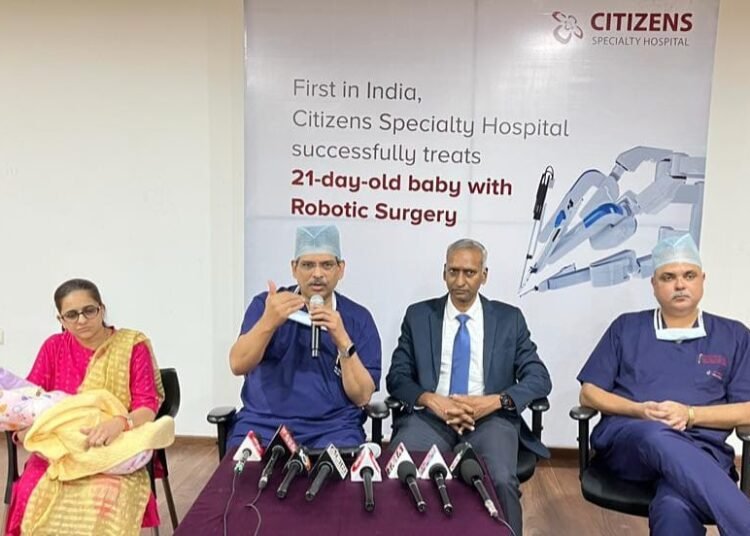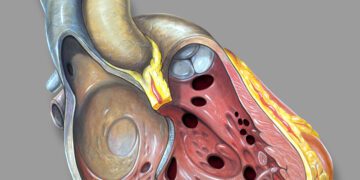By Health In Five Writer
A team led by Prof. Dr Mallikarjuna Reddy, Senior Consultant and Head of Department Urology, Robotic Surgeon at Citizens Specialty Hospital, Hyderabad performed a complex pediatric robotic surgery on a 21-day-old female child, diagnosed with bilateral hydronephrosis. Baby Aparna (name changed) became probably the youngest and first in India to successfully undergo robotic kidney surgery.
The female infant weighed 3.2 kgs was presented by antenatal bilateral hydronephrosis (Swelling of the kidneys). After further evaluation and investigation, she was diagnosed with right pelvic ureteric junction obstruction (PUJO). It is a restriction to the flow of urine from the kidney to the bladder via the ureter, the tube that connects the kidney to the bladder, which if left uncorrected, may lead to progressive loss of kidney function. The degree of a block may vary from minimal to severe. The right kidney had duplicated system and reflux and hydronephrosis into both the duplicated systems.

Dr Banu Teja Reddy, Consultant, Urology, along with Anesthetic team led by Dr Muralidhar Joshi aassisted the successful robotic pyeloplasty procedure. Pyeloplasty is a minimally invasive (Robotic) surgical procedure to correct narrowed or blocked Ureteropelvic Junction or UPJ due to a birth defect. Robotic Pyeloplasty utilizes robotic instruments for the procedure that will include removing the obstructed part and restoring the normal ureter (tube connecting the Bladder and kidney) take advantage of more precise suturing and reconstruction. The procedure was successful, and the baby was discharged within 72 hours.
Dr Prabhakar P, Regional Chief Operating Officer said, “Robotic surgery is the paradigm of the most advanced form of minimally invasive surgery. Although earlier robot-assisted surgeries were technically difficult to perform in pediatric, however, the trend is changing. At Citizens Specialty Hospital, we have performed 75+ pediatric robotic surgeries.”
Elaborating on the procedure, Prof. Dr Mallikarjuna said, “Robot-assisted pyeloplasty in children is safe and effective with excellent outcomes, even in challenging anatomical cases. Robotic technology allows for three-dimensional visualization, motion scaling, tremor filtering, an ergonomic seated position, and wristed instrument motion allowing freedom better than open surgical instruments. There is significant magnification which allows the surgeon to clearly visualize minute structure in small children. This allows the surgery to be precise and the magnification can be adjusted from 5 times to 10 times. When compared to traditional surgery, robotics offers several benefits like minimal postoperative pain, early return to normal activity for the parents too as children recover faster, minute incision scar, burden of post-op visits/studies. There is a significant difference between the outcomes of robotic assisted surgery when compared to open surgery.”
Subscribe HEALTH IN FIVE on WhatsApp & Telegram to receive real time updates








































